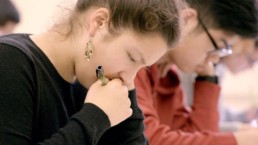‘The Test & the Art of Thinking’ shows the (in)significance of the SAT
This is a custom heading element.
THE TEST & THE ART OF THINKING (2018)
Directed by Michael Arlen Davis
Distributed by Abramorama. 85 minutes. Available to stream this Friday exclusively on Vimeo on Demand.
A test that determines whether a high school student’s college dream is attainable or out of reach should be the best indicator of academic achievement, right? But what if that’s not the case, and this life-changing exam doesn’t actually represent true ability or potential for success in a specific college setting?
In the new documentary The Test & the Art of Thinking, director Michael Arlen Davis paints a vivid picture of how the SAT has been used more as a gatekeeper for elite universities than as an avenue for college applicants. Yet even with the widespread dissatisfaction of this tool, it doesn’t appear that things will be changing any time soon.
Through interviews with SAT tutors, college admissions board members, and students themselves, The Test & the Art of Thinking asks the question: what really constitutes intelligence? By today’s standards, we know that cognitive intelligence is only one predictor of a student’s ability, however kinesthetic, artistic, emotional, and even musical intelligence – all extremely relevant to future success – go relatively unmeasured. The consistent word used to describe SAT questions seems to be “irrelevant” and even SAT tutors themselves go on record to say that they teach students how to outsmart the test’s trick questions rather than prepare them to reflect and summarize what they have actually learned.
The Test & the Art of Thinking is an 85-minute overview that thoroughly delves into the origin and evolution of this 3-4 hour exam that has now become a billion dollar industry of tutors, coaches, and prep courses. This raises the additional question of financial means being tied to test scores. Sadly, the film is another reminder that our country’s educational system has many broken parts and we need to agree on how we can prioritize learning in order to make the necessary and positive changes. Hopefully, this will start with finding more appropriate ways for schools to both measure and value a child’s ability to think, reason, and create.

